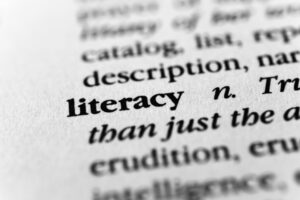One of the biggest challenges I face as an English teacher in a 6th Form College is in helping students to jump a ‘literacy gap’. College students– especially those on A level courses –are often required to have a high level of literacy in order to access the texts and resources for their subject. Yet many of my students arrive at the college unable to read texts at Level 3 unaided.
 My college supports a large cohort of students to re-take their English GCSE in order to access Level 3 qualifications, but literacy can also be an area of weakness even for A level English Literature students.
My college supports a large cohort of students to re-take their English GCSE in order to access Level 3 qualifications, but literacy can also be an area of weakness even for A level English Literature students.
However, resources for literacy teaching are often geared towards much younger students. It can be hard to motivate post-16 students using primary school materials – students end up feeling patronised and it can further damage their self-esteem in some cases. I often find myself re-producing a ready-made worksheet on, for example, spelling and grammar, in order to remove a cutesy picture or to change the scenarios to be more appropriate to young adults.
Tackling the problem of literacy at a whole school level is also tricky. ‘Class readers’ – which can have a positive impact on students’ vocabulary and self-confidence when reading – are not an option on packed BTEC and A level courses where there is often no time to divert from the curriculum.
Literacy Tips for post 16:
- ‘Newspaper time’ in a tutorial group can become a substitute for a class reader. Reading an article together can also be a great way to get students more engaged with the news stories which affect them, especially as many of them will be of voting age.
- Putting key terms up on display can help students to become familiar with the spelling and usage of subject specific terminology at post-16. Ordering the display alphabetically makes it easier for students to organise and retain the terms.
- Don’t assume students have the vocabulary to tackle a text just because they are studying at Level 3. Ask students to highlight words they don’t know in a text and clarify these for the whole class on the board during feedback. Question their knowledge of vocabulary – at this age they won’t always readily admit they don’t know a word. Check they can define it before you assume that they know it.

- ‘Word of the Day’ – have a word of the day pop up on your school’s TV screens, VLE, daily bulletin or in tutor time. Encourage students to get that word into a conversation that day!
- Literacy mark scheme – introduce a whole school mark scheme of symbols for literacy errors e.g. ‘SP’ for a spelling error; ‘P’ for a punctuation error. Teach students to practise identifying 3 or more literacy errors in each other’s essays using the appropriate symbols. Give students the time in class to correct the errors that their partner identified for them. This will quickly enable you as a teacher to determine where errors stem from a lapse in proof-reading and where some literacy input is needed from you.



